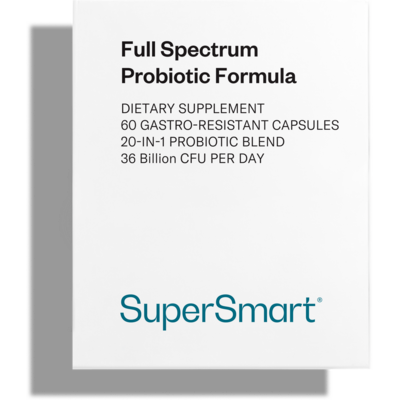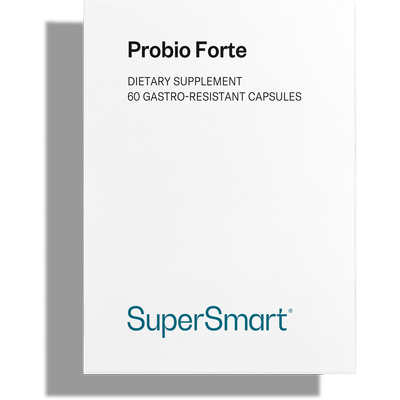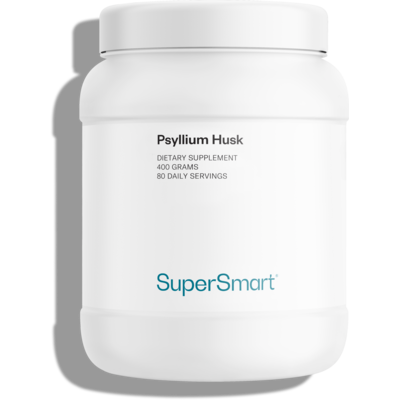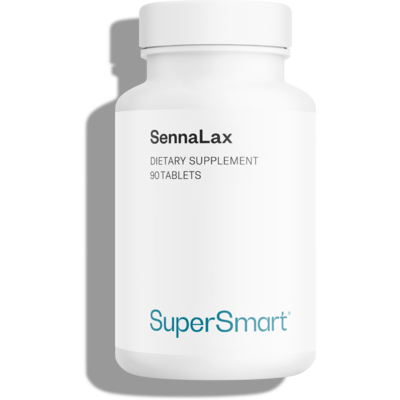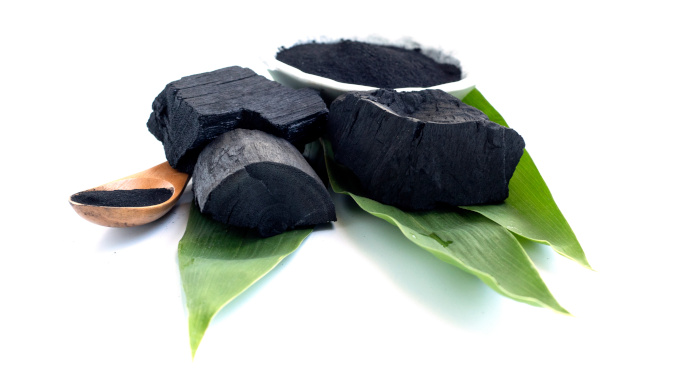Constipation: the 6 best natural laxatives
Do you suffer from constipation? Discover the 6 best natural laxatives for rapid relief and/or long-term prevention.

Constipation: causes and first steps to take
What exactly is constipation?
Constipation is a condition in which bowel movements are difficult or infrequent (fewer than 3 a week). It is often an occasional problem but may become chronic if it lasts more than 6 months.
Typical symptoms include:
- hardened stools;
- significant straining when defecating;
- rectal pain (referred to as rectal plenitude);
- intestinal discomfort, with bloating and stomach aches.
Potential causes of constipation
Constipation can affect anyone. It occurs as a result of various factors (1):
- an unbalanced diet and/or too little fibre;
- insufficient hydration;
- a lack of physical activity or a sudden decrease in physical activity (following an injury, for example);
- a sudden change in habits (following a trip or change of job);
- an episode of significant stress;
- the second half of the menstrual cycle and pregnancy, due to the rise in progesterone which slows down the digestive system;
- certain conditions: irritable bowel syndrome (IBS), hypothyroidism, diabetes, etc.
- certain medications: opioids, anti-depressants, etc.
The first steps to take to beat constipation
- adopt a balanced diet, avoiding heavy, high-fat meals, charcuterie, spicy foods, alcohol and fizzy drinks, and gradually increasing your consumption of dietary fibre. Opt too for foods rich in magnesium (green vegetables, nuts, seeds…) and/or a magnesium supplement (such as Multi Magnesium Formula);
- chew your food thoroughly to facilitate the work of the digestive system;
- drink enough fluid daily, especially between meals;
- make sure you exercise every day (walking, cycling, etc) as it promotes good intestinal transit;
- empty your bowels as soon as you feel the urge, and try to do so at regular times (after a meal, the gut normally undergoes a wave of reflex contractions);
- consult a health professional if your symptoms are particularly worrying or persistent (2). After advising some basic diet and lifestyles measures, and depending on the diagnosis and need, he or she will be able to recommend laxatives: bulk-forming laxatives (which create bulkier stools), emollient laxatives (which soften the stools), osmotic laxatives (which retain water), lubricant laxatives (often with a mineral oil base, which ‘oil’ the intestines) and stimulant laxatives (which activate transit).
The 6 best natural laxatives for constipation
1) Wheat bran, and dietary fibre in general
Dietary fibre consists of specific plant constituents found naturally in vegetables, fruit and especially the outer layers of cereal grains such as wheat, oats and barley.
It is neither digested nor absorbed by the body, and therefore ends up in stools. The greater the amount of dietary fibre, the bigger and softer the stool (as fibre tends to soak up water in the gut), and the lower your risk of constipation.
The recommended intake is 30 grams of fibre a day. As some types are fermented by bacteria in the colon (soluble fibre), it’s best to aim for a gradual increase to give the gut flora time to adapt and minimise the risk of bloating.
Wheat bran (the hard outer layer of the wheat kernel) is the best such example: one 100g portion contains 40g of fibre! It’s one of the most powerful natural laxatives (3).
Use: sprinkle wheat bran on your salads, yogurts, smoothies, cereals… (gradually increasing the amount up to 30g)
Efficacy: strong but the effects are usually only felt after several days or even weeks.
Alternatives: oat bran, rice bran, dietary fibre supplements (such as Organic Acacia).
2) Prunes (dried plums), a well-known natural laxative
As a result of their high content of sorbitol (a particularly emollient type of dietary fibre) and dihydroxyphenylisatin, prunes offer a potentially very beneficial laxative effect.
In particular, they help to stimulate peristalsis (digestive motility) and hyper-hydration of stools, the mechanism of action of osmotic laxatives. This effect is boosted if they are consumed in the form of juice ((a maximum of 1 glass) or when soaked for a few hours before consuming (5).
Use: consume 50g of prunes twice a day for 3 weeks, on the advice of a health professional.
Efficacy: strong but it usually takes several days before the effects are felt.
3) The laxative benefits of blond psyllium
Psyllium seeds were traditionally used by the Egyptians and Native Americans, amongst others, to prevent intestinal discomfort.
It’s the psyllium seed coat or husk which is responsible for this effect: it contains mucilage, a substance that can absorb up to eight times its volume in water. In the stomach, this mucilage forms a gel with fluid ingested during a meal, increasing the bulk of the stool.
Use: Add a tablespoon to warm water (10g in 100ml) and leave to soak for a few minutes, then drink immediately before it thickens, along with a large glass of water (at least 200ml). Repeat up to three times a day for 2-3 days, under the supervision of a health professional. You could also simply take a blond psyllium supplement (such as Psyllium Husk).
Efficacy: moderate and potentially fast-acting (12-72 hours).
4) Flaxseeds for constipation
Like psyllium, flaxseeds contain mucilage.
Since these seeds cannot be digested or broken down by the stomach and gut, they should be coarsely crushed or ground before consuming, in order to release their active molecules for action within the body.
They should be consumed soon after grinding them, as they also contain polyunsaturated fatty acids which are subject to rapid rancidity.
Use: add a teaspoon of ground seeds to a glass of water (200ml) and drink. Repeat up to 3 times a day for 2-3 days under the supervision of a health professional. You can also sprinkle an equivalent amount of ground seeds on fruit compotes or cereal.
Efficacy: moderate with effects usually felt only after several days.
5) The benefits of konjac glucomannan
Glucomannan is a purified form of konjac flour (Amorphophallus konjac), from the Asian tuber.
Like psyllium, it is a form of soluble fibre, but is even more absorbent: its volume increases 17-fold on contact with water, which means you only need a tiny amount to achieve the desired effects.
Use: add 1-3g of glucomannan to a large glass of water (200ml) and leave to soak for 30-60 minutes, drinking the mixture before each meal. Start with 1g and gradually increase the amount if needed and well-tolerated, under the supervision of a health professional.
Efficacy: strong with effects usually felt after a few days.
Alternative: agar-agar, a mucilage-containing substance extracted from various species of red algae.
6) Castor oil: a powerful purgative
Unlike other stimulant laxatives, castor oil does not contain anthranoids, but ricinoleic acid.
It’s this molecule which is responsible for its potentially very powerful purgative effect.
As such, it requires a greater degree of caution (6-7): castor oil should only be used very occasionally and always under the supervision of a health professional. It is contraindicated in pregnant women and children.
Use: take half a teaspoon of castor oil in a single dose after consultation with a health professional.
Efficacy: very strong with very rapid effects (4-8 hours) but may be accompanied by side-effects.
Alternative, gentler stimulants containing anthranoids (8): aloe latex, dried burdock bark (infusion), rhubarb root, etc.
Bonus: probiotics as natural laxatives?
Numerous studies have shown that people who suffer from constipation often have dysbiosis - an imbalance in gut microbiota, either temporary or chronic.
Scientists have thus been investigating whether probiotics are able to restore healthy microorganism populations in intestinal flora, and thus help re-establish normal gut activity.
In terms of constipation, at least three probiotic species have demonstrated success: Bifidobacterium animalis, Lactobacillus casei and Lactobacillus casei rhamnosus.
Use: take a broad-spectrum multi-strain probiotic (such as Full Spectrum Probiotic Formula or Probio Forte) in the morning, 15-30 minutes before breakfast.
Efficacy: good, with effects usually felt after several days or even weeks.
SUPERSMART ADVICE
References
- Rao, Satish S.C. MD, PhD; Lacy, Brian E. MD, PhD; Emmanuel, Anton MD; Müller-Lissner, Stefan MD; Pohl, Daniel MD; Quigley, Eamonn M.M. MD; Whorwell, Peter MD, PhD. Recognizing and Defining Occasional Constipation: Expert Consensus Recommendations. The American Journal of Gastroenterology 117(11):p 1753-1758, November 2022. | DOI: 10.14309/ajg.0000000000001945
- Recommandations pour la pratique clinique dans la prise en charge et le traitement de la constipation chronique de l'adulte. Société nationale française de gastro-entérologie (SNFGE) (2007)
- Ruiz-Roso Calvo de Mora B. BENEFICIOS PARA LA SALUD DIGESTIVA DEL SALVADO DE TRIGO; EVIDENCIAS CIENTÍFICAS [Positive effects of wheat bran for digestive health; scientific evidence]. Nutr Hosp. 2015 Jul 18;32 Suppl 1:41-5. Spanish. doi: 10.3305/nh.2015.32.sup1.9478. PMID: 26267774.
- Bashir A, Sizar O. Laxatives. [Updated 2024 Jan 30]. In: StatPearls [Internet]. Treasure Island (FL): StatPearls Publishing; 2024 Jan-. Available from: https://www.ncbi.nlm.nih.gov/books/NBK537246/
- Scott SM, Knowles CH. Constipation: Dried plums (prunes) for the treatment of constipation. Nat Rev Gastroenterol Hepatol. 2011 Jun;8(6):306-7. doi: 10.1038/nrgastro.2011.82. PMID: 21643036.
- Gaginella et al. Cytotoxicity of ricinoleic acid (castor oil) and other intestinal secretagogues on isolated intestinal epithelial cells. J Pharmacol Exp Ther (1977) PMID: 191594.
- Alookaran J, Tripp J. Castor Oil. 2024 May 24. In: StatPearls [Internet]. Treasure Island (FL): StatPearls Publishing; 2024 Jan–. PMID: 31869090.
- Akram M, Thiruvengadam M, Zainab R, Daniyal M, Bankole MM, Rebezov M, Shariati MA, Okuskhanova E. Herbal Medicine for the Management of Laxative Activity. Curr Pharm Biotechnol. 2022;23(10):1269-1283. doi: 10.2174/1389201022666210812121328. PMID: 34387161.
Keywords
5 Days
great products and prices
great products and prices
Marie
11 Days
Easy to navigate site
Easy to navigate site, had what I was searching for, good price. easy order-check out
James Tucker
17 Days
My skin is clearing up nicely!
Pretty good for my skin so far.
Christian
19 Days
The new packaging is excellent
The new packaging is excellent - finally! No more squashed boxes and torn envelopes.
GORAN
20 Days
Great Product
Great Product
Larry Garrett
24 Days
Quick shipping
Quick shipping; good price. No issues!
Mary McCarty
26 Days
Thr product is very good and is helping…
Thr product is very good and is helping me on my health. Then is always on time
LUGO Luz
28 Days
Buying was fine
Buying was fine. I had problems with the website not recognizing my login info, and had to call to get it fixed. Other than that, everything was good.
David S. Clark
29 Days
Your super maca and super ginseng are…phenomenal
Your super maca and super ginseng are phenomenal supplements that compliment each other when taking them together. Fantastic feeling of well-being and lots of mid day energy without the crash.
Keith Mason
31 Days
I have had amazing results with every…
I have had amazing results with every supplement I've purchased. I am extremely satisfied with this company
kirstin Torres
31 Days
Fine products
Fine products . They are on the leading edge of online supplements. The only issue -so far-is they sometime run out of subscription items.
Jason Argos
34 Days
The ordering process is very user…
The ordering process is very user friendly and the products always come in a timely manner.
CARTER Rhonda
35 Days
The price for Dr
The price for Dr. Pero's AC-11 is reasonable and in line with his views. (my former colleague). Keep it pure.
CAMPBELL Clayton
38 Days
Right on every time.
Right on every time.
Arthur Nicholas
41 Days
They are cheaper than everyone else and…
They are cheaper than everyone else and the shipping was fast. Great company.
Patricia Adams


